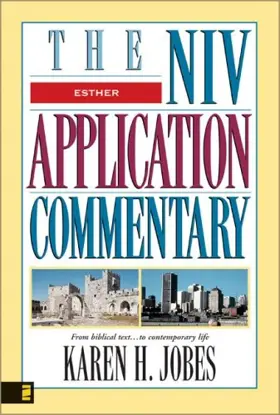

Esther
Pages
256
Publisher
Zondervan
Published
1/1/1999
ISBN-13
9780310206729
Collections
This book appears in the following featured collections.
- Favorite Commentaries for Personal Study by Jeremy Pierce (parableman)
- First Commentary Set by Brian LeStourgeon
- Tremper Longman's 5-Star Commentaries by Tremper Longman III
- Basic Library Booklist by Detroit Baptist Theological Seminary
- Building an OT Commentary Library by Invitation to Biblical Interpretation (Kostenberger & Patterson)
- Commentaries by Female Scholars by John Dyer
- Top Old Testament Commentaries by Engaging Scripture (Nijay Gupta's Substack)
- TGC: Introductory Commentaries by The Gospel Coalition
Reviews
Longman names Jobes’s commentary as “the best commentary to buy on Esther. It is informative about [the text’s] original meaning and insightful on how to apply it to the contemporary world. Jobes is theologically astute and a good writer.” Jobes’s work on Esther has wide acclaim because her writing is accessible to both laymen and scholars. This volume demonstrates her familiarity with the text and ability to find rich application for the present day.
[Full Review]
This commentary series aims to bridge the ancient context with that of the contemporary one. Each chapter is divided by Esther’s literary unit, from stating its original meaning to bridging context to contemporary significance. The annotated bibliography on Esther (pp. 52-55) is helpful in providing the secondary literature on the book of Esther.
[Full Review]
Although I would have liked more technical notes, being the nerd that I am, I recognize this is not the series for that. In every other category, this commentary excels. Jobes handles the themes of this narrative masterfully, and I wouldn't dare preach on Esther without consulting her.
I have become a collector of commentaries ever since my seminary days in the 1990s. As such, I am only going to recommend the best overall commentary for each book of the Bible on this site. For Esther, for the preacher/teacher, it is hard to beat Karen Jobes' contribution. She explains the text remarkably well and bridges its message to a contemporary context. If you only could have one commentary on Esther in your library, pick this one up.
This is the only commentary I own on Esther at the moment. But this is a solid example of what a mid-level, pastoral commentary should look like. It is not only written with expertise of the subject (Jobes did her doctoral research on the Greek text of Esther) but is done in a way which is engaging, challenging, and fun even (and how often do you get to say that about a commentary?). The introduction is not just a revisiting of the usual intro topics (date/structure/canonicity etc - though Jobes covers all of these very capably) but an exercise in hermeneutics and the doctrine of Scripture. The uniqueness of Esther presents key theological questions which Jobes brings to the fore. How is a text which doesn't mention God, the Law, Temple, worship, etc. to be understood as holy scripture? What can we say about inspiration and authority from a text like this? Throughout, Jobes is able to capture the artistry of the text and all the subtle plays which make Esther so potent.
I always appreciate it when there is clear consensus on the best commentary on any given book of the Bible. For Esther, that honor goes to Karen Jobes. Keith Mathison agrees with the other experts when he says, “Karen Jobes has written the most engaging, interesting, and helpful commentary on the book of Esther presently available. Her knowledge of the text is extensive, and her insights into current application are valuable. The commentary is accessible to laymen, but should be useful to pastors and scholars as well.”
[Full Review]
Outstanding example of the strengths of the NIVAC series - explaining the historical background and meaning, but moving on to very interesting discussion of the theological issues raised by the text.
[Full Review]
Karen Jobes has written the most engaging, interesting, and helpful commentary on the book of Esther presently available. Her knowledge of the text is extensive, and her insights into current application are valuable. The commentary is accessible to laymen, but should be useful to pastors and scholars as well.
[Full Review]
This is an amazing little work. Clear and lucid, Jobes has not ducked the tough issues in this literary treasure. She avoids idealizing any of the characters and let's the text speak for itself. When the text is silent, Jobes argues, we should be silent. If we are not told why Esther went to the harem we should not speculate. The only weakness was Jobes's discussion of chapter 9 and the Jewish defense. She interprets their self-defense through the lens of Old Testament Holy War, an interpretation I deem unwarranted from the text itself. But judge for yourself. This is a marvelous commentary.
This is the only NIVAC on my First Commentaries list. Jobes is clearly informed by the scholarship, but is fully focused on explaining and applying the literary themes of the book.
Very useful commentary that offers theological reflection and practical applications based on solid exegesis. Evangelical.
[Full Review]








